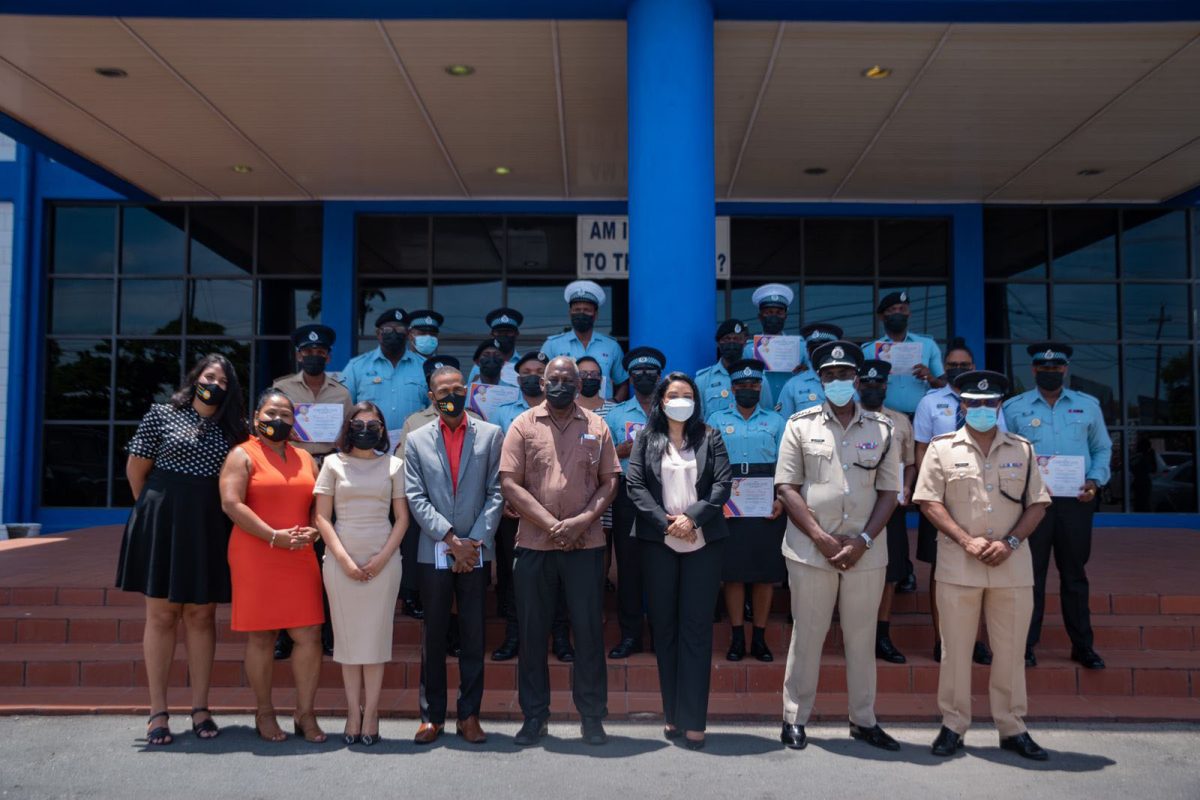Seventeen police officers yesterday graduated after successfully completing training on how to deal with domestic violence reports under the recently launched COPSQUAD 2000 initiative.
The ranks are the first batch of policemen and women who are expected to benefit from the initiative by the end of this year. A total of 2,000 is being targeted.
The initiative which was launched in August this year by the Ministry of Human Services and Social Security (MOHSSS) in collaboration with the United Nations Population Fund is part of the strengthening of the national response against all forms of violence against women and girls.
The police officers were each outfitted with a badge which will help victims to easily identity the ranks they are reporting to.
Delivering remarks at a graduation ceremony which was held at the Police Officers Training Centre yesterday, Minister of Human Services, Dr Vindhya Persaud called on the trained officers to be influencers of the force.
“You are the pioneers of the COPSQUAD initiative and I feel in my heart that you will do justice to the training that you would have received through this initiative…This means you have to be examples…..This is a tough one,” Persaud said.
“It means even if issues arise in your personal relationships or the environments in which you find yourselves you have to be able to put into practice all that you have learnt….. I believe that you have been exposed to all of the information that you require to put you in good stead to respond, to react, to report and definitely to take condign actions against those who are offenders,” she explained.
According to Persaud, the training will be accompanied by many more interventions during which the ranks are expected to benefit from more information, education and awareness that will guide them in executing their duties.
“….If we can harness the energies that you would have expended in your training to make the kind of difference in all of the communities that you will be placed, I think our country can see a reduction of numbers,” she urged.
Persaud explained that at least 90 percent of the persons who experience gender-based violence are women. “The number may have varied slightly but it means that we are still in a situation that continues to haunt our country where women and girls remain unsafe,” she said.
Like women, Persaud further stated that men must also feel equally safe to report such cases.
She advised the officers to use the knowledge gathered in the training and help towards developing healthy conversations which could avoid eruption of violence.
“It is not only the point of intervention but let us look at prevention….Don’t dismiss anyone. Don’t make anything less important,” she said.
According to statistics provided by Commissioner of Police (ag) Nigel Hoppie yesterday, as of September 24, 2021, six women were killed by their partners.
For the same period last year, Hoppie said a total of eleven women lost their lives in the same manner.
During the period of January to August, 2020, Hoppie added that the Guyana Police Force received 1135 Domestic Violence reports.
Hoppie said while the prosecution of the offenders is the main role of the police, the force is involved in all aspects of educating its ranks on the issue. “The topic is part of the police officers training programmed curriculum as well as numerous training programmes,” he said.
The initiative, according to Hoppie will improve the knowledge of the ranks and help them to understand the laws and policies against domestic violence.
“The Guyana Police Force as the premier law enforcement agency has been and will continue to give support to the Government and the Ministry of Human Services and Social Security in its strenuous effort to deal effectively with domestic violence in society,” he noted.
Meanwhile, Minister of Home Affairs Robeson Benn told the officers they are expected to be “champions of change”.
Benn said that one of the main reasons why violence usually escalates is how the police engage the victims.
He said even though the police stations are equipped with special spaces to engage women and children who are victims, communication and engagement remain a challenge.
“Sometimes we go back to the station, we go back to the whole normal culture of don’t worrying about it…..And when we don’t want to touch it because we have sometimes amongst us personal guilt feelings with respect to the problem but as a result of this training, you are expected to become the champions of the process of change to make this issue better,” Benn said.
He further stated that the only way the issue can be dealt with is for the necessary actions to be taken. “…The only way we can deal with it…is to take condign action….and this is not a personal issue, it’s a professional issue,” Benn advised.





